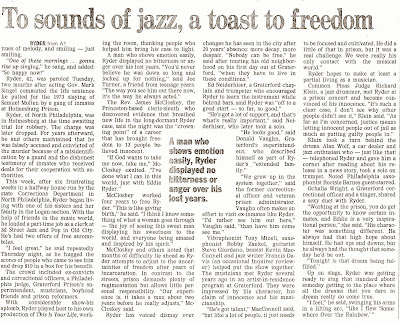Here was the denouement to the Matthews and Wright story. Two years after we broke the story and explained the scam, court evidence confirmed our reporting as it sent the Wall Street firm's principal protagonist to prison.

BOND-FRAUD SCANDAL'S LATEST CHAPTER: PRISON
By Howard Goodman
Inquirer Staff Writer
To Moshe Lichtman, a developer who tried in 1986 to bring a major trash
resource-recovery plant to the ailing city of Chester , the attitude of
Matthews & Wright Inc.'s municipal- bond chief Arthur Abba Goldberg
was best expressed when Goldberg jokingly described a bond issue the
firm had underwritten in Guam as "selling bonds to the cannibals. "
"Lichtman thought this to be ironic," reads a recently released FBI
report, "because Goldberg had food dripping out of his mouth when he
said it. "
Exploitation, racism and gluttony - the themes surge through the
evidence amassed by prosecutors in the Goldberg case, which came to its
probable end on Monday with the one-time Wall Street wunderkind
sentenced to 18 months in federal prison and ordered to pay $400,000 in
fines and restitution.
The sentence, by U.S. District Judge Jesse W. Curtis Jr. in Los
Angeles, came two months after Goldberg pleaded guilty to three counts
of mail fraud for playing the key role in a bond -fraud scandal that
rocked the financial industry when it came to light in 1987.
With a breathtaking appetite, the evidence shows, Goldberg lured some
of America's poorest communities into the municipal- bond business to
make huge sums of money for his firm, never caring whether the trash
plants or housing projects that the bonds were supposed to finance were
ever actually built.

































